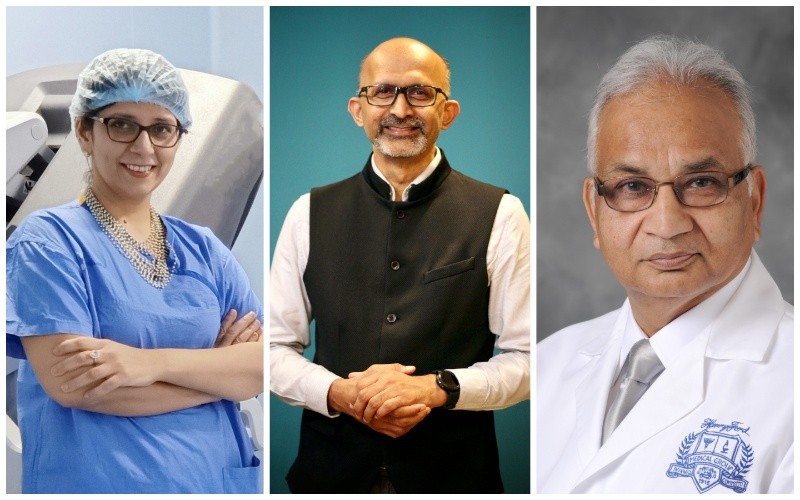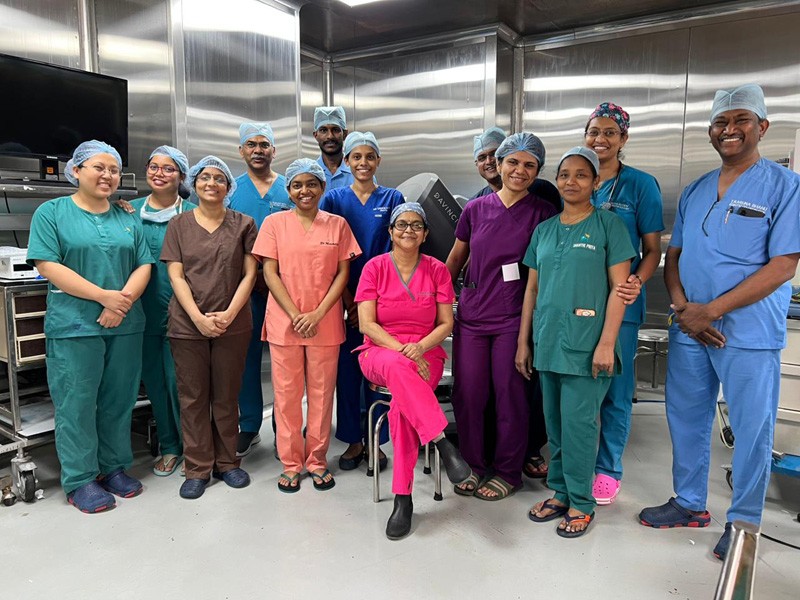 Robotic Surgery
Robotic Surgery
Embracing Robotic Surgery key to improving women"s disease treatments: Gynaecologists
Robotic surgery with its advantage of minimal invasion of the body, less blood loss translates to quicker patient recovery and better cosmesis has significant relevance to women in general and Indian women in particular.
“A woman is the core foundation of an Indian family and when she is taken ill it completely disrupts the life of each member of the family. Robotic surgery has facilitated them to return to normal function even after major surgical undertakings,” says Dr Mahendra Bhandari, CEO, Vattikuti Foundation that has been championing Robotic Surgery in India through its capacity building programs.
Even though in the list of the advantages of robotic surgery, cosmesis falls low in the list. However, in the Indian context it is very significant particularly so for young unmarried girls, where surgical scars are being considered as a stigma.
Pioneer surgeon Dr Sandeep Nayak’s pioneering robotic surgical techniques to perform thyroid and lymph nodes surgery through almost invisible healed scars are very popular with young women conscious of their body image, adds Dr Bhandari.
Dr Nayak’s innovative robotic surgery procedure was adjudged among the best 3 entries at the KS International Innovation Awards 2023 out of 140 entries from over a dozen countries.
Today India has a large workforce of women robotic surgeons in different specialties performing robotic surgery with excellent patient outcomes. Since Robotic surgery helps women recover faster from women’s diseases gynaecologists see significant rise in its adoption.
Endometriosis, affecting 20 percent of women worldwide, is a chronic inflammatory condition requiring complex surgical interventions.
“Robotic surgery presents advantages such as enhanced precision, safety, and faster recovery. Uterine, cervical, and early ovarian cancers too can now be treated robotically with minimal incisions, ensuring a pain-free recovery and positive outcomes for patients,” says Dr Anshumala Shukla Kulkarni, Head - Minimally invasive Gynaecology, Laparoscopic & Robotic surgeon, Kokilaben Dhirubhai Ambani Hospital (KDAH), Mumbai.
One of the primary reasons for the low adoption of robotic surgery is the lack of awareness among patients. A survey among patients visiting gynaecology department at KDAH found that over 50 per cent of patients were unaware of the benefits offered by robotic surgery technology.
“Addressing this awareness gap is crucial for promoting the wider acceptance of this advanced surgical approach,” adds Dr Kulkarni, who chose to focus on robotic surgery early on in her practice as she saw a bright future for modern surgical techniques in healthcare.
Despite the growing number of women taking up robotic surgery there is a scope for improvement as the costs come down. Currently, robotic surgery costs are much higher than open surgery. In most families, the decision for whether to go in for Robotic Surgery or Open surgery is taken by men and not the women themselves.
Dr Rooma Sinha, professor of robotic gynaecology surgery, Apollo Hospitals, Hyderabad calls for a universal adoption of robotic surgery in government Medical Colleges, Trust hospitals, where women can get access to the same technology and benefits of surgery at lower costs leading to better outcomes and quick recovery.
Once that happens women will have a win-win situation for health issues like benign gynaecology, or fibroids, endometriosis or bleeding disorders. They can undergo a minimal access surgery by expert robotic surgeons and benefit from a quick recovery, less blood loss, negligible pain, and they'll be up and about on their feet in no time.

Through ‘Humans at the cutting edge of technology’ symposia, regular webinars by international faculty Vattikuti Foundation has been meeting the needs for continuous upskilling by surgeons to stay relevant and provide the best care for their patients.
Vattikuti Foundation’s one-year paid fellowship to young super specialist surgeons has been meeting the need to train surgeons under mentorship of accomplished surgeons in the latest methods of minimal access surgery.
Top Headlines
-
Health
Diabetes, muscle loss and the illusion of quick fixes: Why lifestyle correctionnot shortcutsremains our strongest medicine
February 18, 2026
-
Health
Kolkata: Rotary Club of Calcutta Pointers, Indian Cancer Society host cancer awareness, screening camp
February 17, 2026
-
Health
Akhil Bharat Jaiguru Sampradaya and Omkarnath Mission volunteers care for terminally ill patients at Mahamilan Math hospice
November 05, 2025
-
Health
Ayurveda and Skin Health in the Modern Age
October 09, 2025
-
Health
MedSage expands footprint with new branch in Rampurhat
October 04, 2025
-
Health
Vijaya Diagnostic Centre inaugurates State-of-the-Art Centre featuring first advanced 3 Tesla MRI in Kolkata
September 11, 2025
-
Health
Ayurveda and the urban woman: Practical science for a healthier, calmer life
September 07, 2025
-
Health
Rotary Club of Belur strengthens Kolkata healthcare with donation to Ramkrishna Mission Seva Pratishthan
August 25, 2025
-
Health
Parampara Ayurveda founder Dr. Debabrata Sen shares wellness strategies for desk-bound professionals
August 08, 2025
-
Health
Kolkata: Mega health camp transforms lives in Ultadanga slum with free multi-specialty services
August 02, 2025
